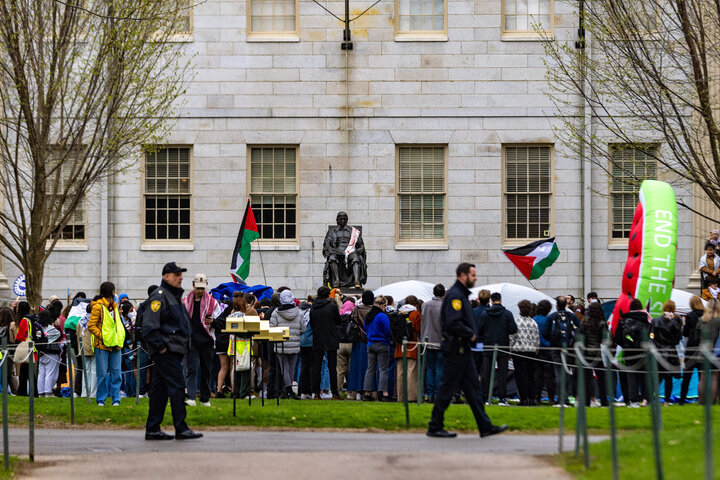Harvard Professors Take Legal Action Against Trump Over $9 Billion Funding Review
The Harvard faculty chapter of the American Association of University Professors, along with its national counterpart, has taken a significant step to protect academic freedom and free speech on campus. In a recent lawsuit filed on Friday in a Boston federal court, they asserted that the university administration is allegedly attempting to unlawfully undermine these fundamental principles. This legal action highlights ongoing tensions surrounding academic governance and federal funding at prestigious institutions.
The lawsuit, which includes a motion for a temporary restraining order, raises critical points regarding the federal government’s scrutiny of Harvard’s funding. The plaintiffs argue that the government’s review process has been “arbitrary or capricious.” They contend that there has been a lack of a reasoned explanation regarding potential threats to withdraw nearly $9 billion in federal funding.
A spokesperson for Harvard University confirmed the receipt of a letter from a federal task force earlier this month. This letter outlined specific policy demands tied to the substantial federal funding that the university receives. Among the significant issues raised, as reported by the Harvard Crimson and other media outlets, are:
- Elimination of Diversity, Equity, and Inclusion Programs: The federal task force has called for the removal of these programs, which have been a cornerstone of Harvard’s commitment to fostering an inclusive campus environment.
- Ban on Masks at Campus Protests: Additionally, the task force has demanded a prohibition on the use of masks during protests on campus, raising concerns about safety and expression.
The implications of these demands have stirred considerable debate among faculty members, students, and academic leaders. Many argue that such measures could significantly restrict the ability of faculty and students to express dissenting opinions and engage in scholarly discourse. The lawsuit aims to challenge these developments, seeking to affirm the rights of academic professionals and students to engage freely in discussions without fear of retribution or funding withdrawal.
The Harvard faculty chapter, in its legal filing, has emphasized the importance of maintaining an academic environment where ideas can be freely exchanged and debated. They believe that any attempt to impose restrictions on academic freedom undermines the very foundation of higher education. The suit expresses that the university should not be compelled to conform to external pressures that may inhibit its mission of education and research.
Moreover, the faculty’s concerns extend beyond the immediate demands of the federal task force. There is a broader context in which academic institutions are being scrutinized regarding their commitments to diversity and inclusion. Critics argue that dismantling such programs could lead to a less equitable academic landscape, impacting recruitment, retention, and the overall student experience.
The lawsuit’s timing also coincides with a national conversation surrounding academic freedom and institutional autonomy in the face of governmental influence. Many universities across the United States are grappling with similar challenges, as state and federal governments increasingly seek to impose their agendas on campus policies.
In light of these developments, the Harvard faculty chapter is rallying support from fellow educators and academic organizations nationwide. They are advocating for a collective response to protect the principles of academic freedom and free speech, emphasizing that these values are essential not only to Harvard but to the integrity of higher education as a whole.
The outcome of this lawsuit could have far-reaching implications, not just for Harvard University, but for academic institutions across the country. As the litigation progresses, stakeholders will be closely watching how the courts interpret the balance between federal oversight and institutional autonomy.
In conclusion, the lawsuit filed by the Harvard faculty chapter of the American Association of University Professors against the university administration signifies a crucial moment in the ongoing discourse about academic freedom and the role of federal funding in shaping university policies. The legal battle will likely serve as a precedent, influencing future discussions on how universities navigate the complexities of funding, governance, and the preservation of academic integrity.






